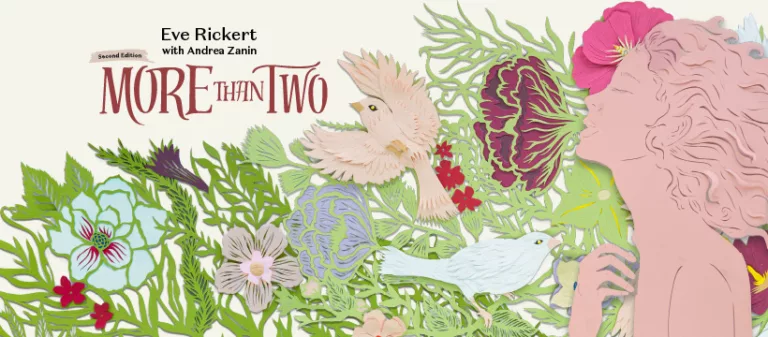Stop me if you’ve heard this one before.
Alex is in a relationship with Kris, who’s in a relationship with Kate. Kris is devoted to both Alex and Kate. Alex is considerate of Kris’ feelings, responsive to Kris’ needs, and has worked to build a healthy, reciprocal relationship with Kris. Kate…well, Kate is happy enough to have Kris in her life, so long as Kris is the one to put the effort in. Kate shows up when she feels like it. Kris rarely knows where they stand with Kate.
Alex has spent countless hours processing with Kris about the relationship with Kate. Alex has held Kris while they cried, given advice, helped distract Kris from all the complicated feels about Kate.
In other words, Alex provides most of the emotional support for both Alex’s relationship with Kris and Kate’s relationship with Kris.
But it doesn’t stop there. Alex has another partner, Jordan, whom Alex turns to when they need support for their relationship with Kris. Because Alex is doing work on behalf of the Kris-Kate relationship, and in truth, all the energy Kris puts into the relationship with Kate means that a lot of the time, Kris doesn’t have much left over for Alex. So it’s a good thing for everyone that Alex has Jordan to lean on. (Depending, of course, on how Jordan feels about it.)
Welcome to the polyamorous emotional labour daisy chain.
Emotional labour, if you’re late to the party, refers to all forms of effort involved in caring for another person’s feelings, from remembering birthdays or food allergies to listening to a friend vent to holding someone’s hand while they’re suffering or grieving. There’s a lot of it. And it’s not inherently a problem: it’s the glue that holds society together. The major problems that arise with it—and the reasons so many people are talking about it—are twofold: societally, the expectations for most emotional labour fall on women, and it is chronically undervalued as a form of work.
The polyamorous emotional labour daisy chain occurs any time there’s a problem in one relationship that spills over into the other relationships in a network. The emotional labour pours inward, from person to person, toward the source of the problem—as each person in turn leans outward, toward a partner who has emotional labour to give. (This happens in friend groups, too. But often the expectations are higher in romantic relationships—and boundaries can be harder to set.)
I have been part of polyamorous emotional labour daisy chains more times than I can count. I have lost friends and nearly lost partners by leaning out too hard and taking the availability of emotional labour for granted. I have also been the one to process with my partners, over and over, about their hurtful relationships; I’ve been the shoulder they cry on.
Sometimes the problem is an abusive relationship. Sometimes it’s a dysfunctional pairing of an anxious-attached partner with an avoidant-attached one. Sometimes it’s a chronic or acute illness, addiction, financial stress, a new baby, grief, or some other crisis or major life event. Sometimes someone is just being a jerk.
Not all instances of the polyamorous emotional labour daisy chain are actually dysfunctional. At its best, it’s really just a special case of the ring theory of caring for people in a crisis. This is how families, communities, and societies work—when they are working well. People take care of each other. People give when they have it in them to give, and they receive when they are in need. When that happens in a poly network and it works well, for everyone involved that’s awesome.
And so I don’t want you to read this piece and think there’s anything wrong with seeking support from your partners. I don’t want you to feel embarrassed or ashamed if you find yourself the focal point of the chain because something stressful or awful is going on in your life. You deserve love and support. And I definitely don’t want you to use this piece as a weapon for shaming partners for having needs.
However, if you do recognize an emotional labour daisy chain that you’re a part of, it never hurts to check in with everyone else to make sure everything that’s going on is consensual and is working for everyone involved. A lot of times, these things work right up until they don’t—and people need to know it’s okay to express when it stops working for them, before resentment starts to build.
And.
Sometimes things get set up in such a way that certain people are expected—or even required—to consistently provide emotional labour, while others are consistently exempted from it. Case in point: As mentioned above, the first major discussions of emotional labour centred on the ways in which women are socialized (and expected) to provide emotional labour to men. It shouldn’t be surprising, then, that often you see similar patterns play out in poly relationships. But that’s not always the case: I’ve seen—and been in—plenty of situations where one or several men form crucial links in the daisy chain.
One specific example of a structural imbalance in emotional labour is the unicorn-hunting couple. If you look closely at what they say they’re looking for, often it becomes clear that what they want is a woman to provide emotional labour for the two of them, while expecting little to none in return. What makes this particular situation especially messed up, though, is that often they’ll say that they don’t want her to have other partners—in essence, denying her the ability to seek out emotional care from others.
And you know what? Taking care of each other, supporting each other and helping each other out is cool. But setting up structures whereby certain people are consistently excused from performing emotional labour and certain people are expected to always provide it is not cool. It’s not cool in society, and it’s not cool in a polyamorous network.
And those structures are really just a special case of the general case of entitlement to emotional labour. Like all forms of entitlement in relationships, the moment you start feeling like someone owes you emotional labour, things will get fucked up.
Another place the polyamorous emotional labour daisy chain causes problems is when there’s someone who has a hard time setting boundaries and consistently accepts poor treatment from partners. Often it’s these kinds of people who have a chronic tendency to be at the centre of the circle. They may consistently give more to certain relationships than they get back, and they may feel like hey, it’s okay, they have that to give.
Except that sometimes the reason they have so much to give is that there’s another partner in the background (or more than one)—people like Alex in our story—performing the emotional labour for both their own relationship and the other, lousy one(s). I think sometimes such a setup can even provide a kind of backup energy source for shitty relationships that really ought to end. I think sometimes they can make it so that even though they hurt, it never hurts quite enough to leave. So if you’re that person who can’t leave the bad relationships, think on that—because often what it means is that there’s another person absorbing your pain.
I don’t know what the solution to this is. But I know one thing: Taking care of your partners means taking care of yourself, too. And that means setting boundaries with people who treat you badly—no matter how much you love them. And it means limiting what you give to relationships that don’t give back. You may think that love conquers all; you may think that you can endlessly pour your love into someone in the hope that they’ll return it someday; you may think these are your decisions. And they are. But understand these decisions are not just about you. People you love will feel it. They will pick up the pieces.
For those of you waiting for Part 3 in my hierarchy series…I’m still working on it. I’ve hit an unexpected logical puzzle that I need to work through, and that’s taking some time. I hope to have it up in the next couple of days. This post was the one I needed to write today.


